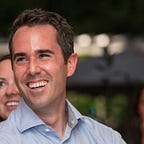Protecting space for civil society, defending human rights and fundamental freedoms for all
This week, some 1,300 diplomats, international experts, and human rights defenders from 57 countries in Europe, Central Asia, and North America will gather in Warsaw for Europe’s largest human rights conference — the Organization for Security and Cooperation in Europe’s annual Human Dimension Implementation Meeting. The annual meeting has its origins in the Helsinki Process, where countries from across Europe, Central Asia, and North America came together to evaluate progress on meeting their shared commitments to promote and respect universal human rights and fundamental freedoms.
Four decades later, the OSCE’s shared efforts to protect fundamental freedoms, universal rights, and human dignity are as important as ever. Today, in too many parts of the OSCE region, space for civil society is under attack. Too often, journalists, non-governmental organizations, minority groups, human rights advocates and even non-partisan polling organizations face pressure, violence, intimidation, and arrest for standing up for our shared values — values that all 57 OSCE states have pledged to protect.
The OSCE’s Human Dimension Implementation Meeting provides an open space for government and civil society to have a real conversation about where we’re making progress and where we’re falling short. Human rights defenders and concerned citizens have an equal seat at the table with governments. They have the opportunity to make their voices heard and hold their own and other governments accountable in the presence of senior government officials from each of the OSCE’s 57 participating States. That’s particularly important for civil society activists and organizations that are pressured and persecuted by their governments at home. Many of them take personal risk to attend the conference. Some are even banned by their home countries from doing so.
Since the beginning, human rights defenders have been the life force of the Helsinki Process. It is crucial that we preserve the space for their important work. Countries must move beyond signing up to protect human rights and stand up for them in word and deed. At a time when dangerous voices, cynicism, and complacency threaten the rules-based international order we have worked so hard to build, we need to reinforce the rules that protect the freedoms and values we hold most dear. Because when countries violate their citizens’ fundamental freedoms and human rights, they endanger peace and security not only within their borders, but beyond them too. Protecting human rights and ensuring our common security go hand in hand.
This week in Warsaw, and every day throughout the year, we must stand with those in Baku and Ashgabat; Moscow and Dushanbe; Ankara and Astana; Budapest and Bishkek; Minsk, Tashkent and beyond to defend human dignity, universal rights and democratic governance. Protecting their voices, their energy, and their activism is critical to achieving the lasting peace and prosperity our people want and deserve.
About the author: Daniel B. Baer serves as U.S. Permanent Representative to the Organization for Security and Cooperation in Europe
